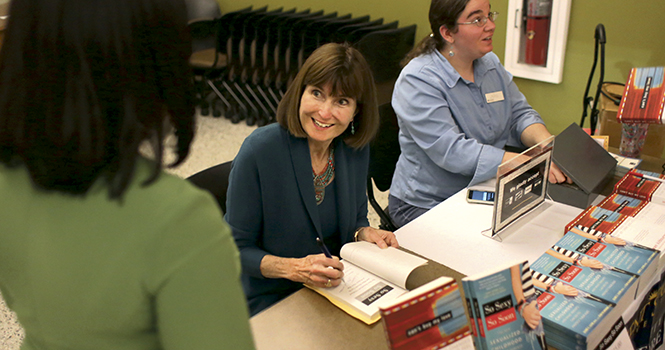Jean Kilbourne advertises “The Naked Truth”
Jean Kilbourne signs copies of her books after giving a presentation in Oscar Ritche Hall on April 8. Kilbourne who is the author of ‘Killing Us Softly’, gave a presentation about how some advertisers use photo editing to objectify women in their work. Photo by Brian Smith.
On average, only eight percent of an advertisement’s message is conceived by the conscious mind.
Jean Kilbourne invited students to learn about the remaining 92 percent in “The Naked Truth: Advertising’s View of Women” in Oscar Ritchie Hall Monday night.
Kilbourne, an internationally acclaimed filmmaker, speaker and educator, spoke about the ways women are portrayed and perceived in advertising.
“Supermodel Cindy Crawford once said, ‘I wish I looked like Cindy Crawford,’” Kilbourne said at the beginning of her presentation.
Kilbourne showed advertisements of famous women whose bodies were altered with Photoshop, including Beyoncé Knowles with skin several shades lighter than her natural color and Katie Couric pictured 20 pounds lighter than her actual weight.
Kilbourne continued to talk about issues women have with their bodies. She said visuals in the media can make them want to be “perfect.”
“Women are considered beautiful and attractive only if they stay young-looking,” Kilbourne said. “Our popular culture seems to have the ability to make nearly anyone of any skin color and body type feel badly about their bodies.”
Kilbourne went on to discuss products sold through sexual advertising, showing photos of models holding products like perfume with little to no clothing.
“These images make us feel less sexy,” Kilbourne said. “However, the most dangerous thing to do is sell sex and violence together.”
Kilbourne presented a Jimmy Choo advertisement of a woman lying in the trunk of a car wearing heels as a man digs a hole with a shovel. The audience looked on, half curious, half disturbed.
Kilbourne ended her presentation on a positive note. She told the audience public health issues in the media can only be resolved by changing the environment.
“I urge you to go out and look around you,” Kilbourne said. “Pay attention to the media and the message being conveyed.”
Melissa Shoff, a senior psychology major said she feels women are portrayed differently in the present media.
“Advertisements are showing women as skinnier and skinnier,” Shoff said. ‘Normal’ body types in the 50s would be considered overweight today.”
Brooke Bennett, president of the National Residence Hall Honorary that sponsored the event along with the Women’s Center and Undergraduate Student Government, said she hopes the audience will view advertisements more objectively.
“You see ads again and again,” Bennett said. “I think they can manipulate us, and that’s something we face everyday.”
Contact Caitlin Potts at [email protected].



